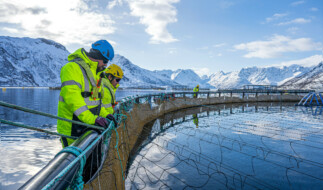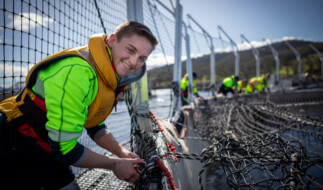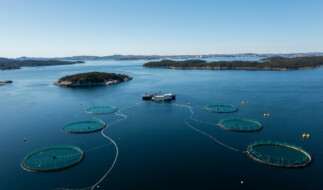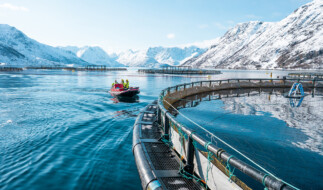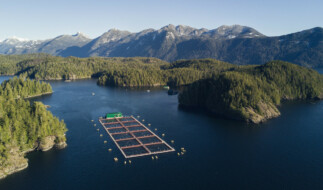Sea the opportunity: how collaboration is mobilizing climate action
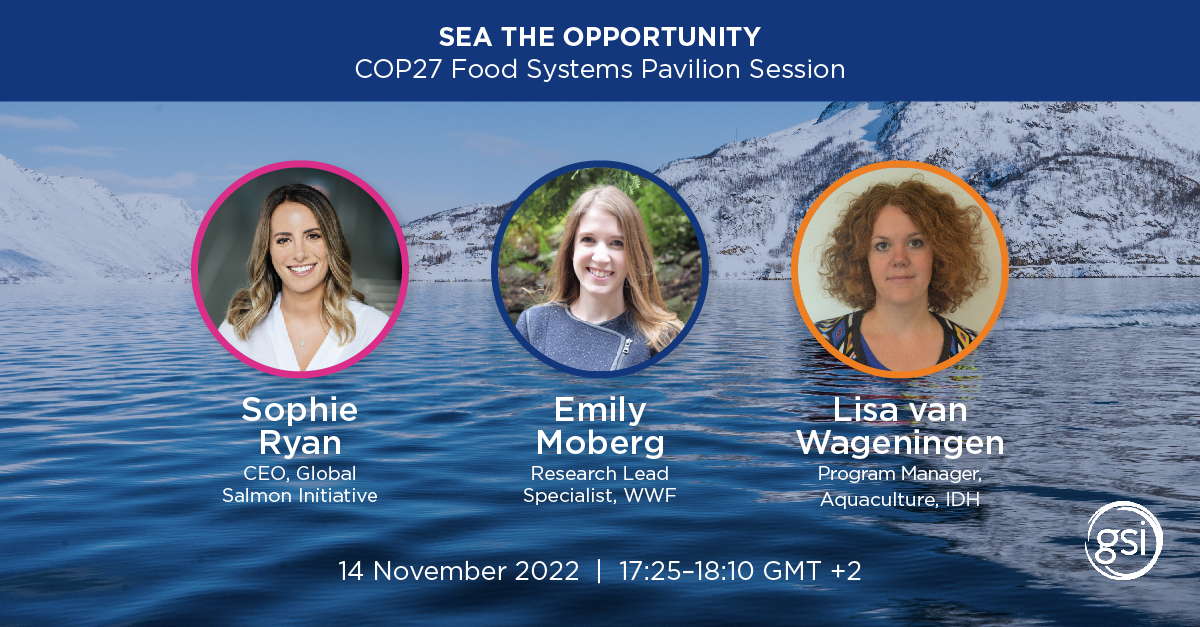
GSI joined the first Food Systems Pavilion at COP27 alongside partners WWF, IDH and Wegmans, to talk about how salmon aquaculture is laying the path for climate action in blue foods.
As the 2022 United Nations Climate Change Conference (COP27) kicked off, experts acknowledged that we are not on track to hit the climate targets set out as part of the Paris Climate Agreement to curb global warming to 1.5 degrees C. Set against a backdrop of extreme weather events worldwide and an energy crisis propelled by the war in Ukraine, the UN Secretary General said this COP must deliver a “down-payment” on climate solutions that match the scale of the problem. And it’s that point of scale which is so important, and where the session focused on examples already happening in the farmed salmon sector.
GSI Joins Session at COP27 Food Systems Pavilion
Food systems are responsible for a third of global greenhouse gas (GHG) emissions, and this year for the first time, COP had a pavilion dedicated to sustainable food systems, including an entire day dedicated to the role of blue (aquatic) foods in healthier, more resilient and equitable food systems. Our CEO, Sophie Ryan, was selected to join a panel alongside Emily Moberg of the World Wildlife Fund (WWF), Lisa van Wageningen of IDH The Sustainable Trade Initiative, and Steven Phillips of Wegmans Food Markets, to discuss the opportunity for blue foods in climate-resilient diets. Together, in a discussion moderated by Avrim Lazar, Independent Consultant, they shared their perspectives on:
- The role of aligned, consistent data to document aquaculture’s role in low carbon food systems
- The need for continuous improvements across the supply chain
- How collaboration is crucial in driving progress at the speed and scale needed
Emily opened the discussion by sharing why it’s so important we stop siloing blue foods out of the mainstream conversation when it comes to food systems and climate. She highlighted how aquatic foods are inextricably intwined in diets globally, but also culturally relevant, huge parts of economies, livelihoods, and a critical source of high-quality protein for many people around the world. It’s clear that we must all work to continually include them alongside agriculture in food policy dialogues and decisions, and better acknowledge them as part of the answer to many of the world’s sustainability and nutrition challenges.
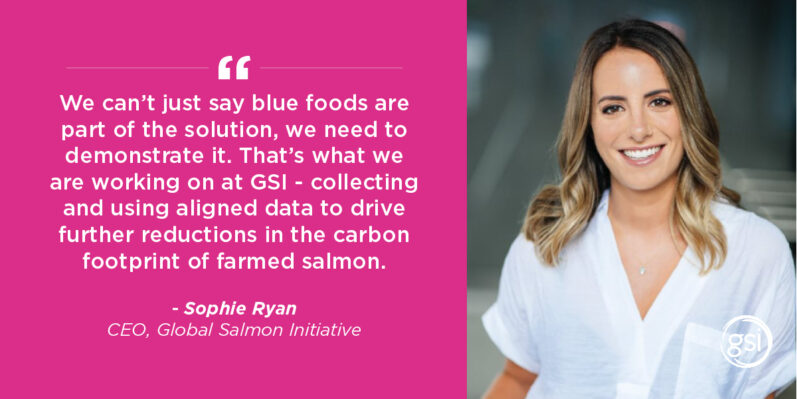
Blue foods do offer a smart choice when it comes to the future of food systems. Sophie highlighted how the beneficial role of blue foods is widely known – from being highly nutritious, low contributors to GHG emissions, as well as using less fresh water and land than other protein sources – but we can’t stop there, continuous and further improvements are still needed to ensure they continue to form part of a resilient food system.
This is where the key theme of data comes in. It’s important we ground our choices and decisions based in credible data sourced from robust frameworks. These data not only demonstrate where we are today, but more importantly can help focus efforts on the hot spot areas for mitigation and allow for shared learnings across companies and supply chains to drive further improvements.
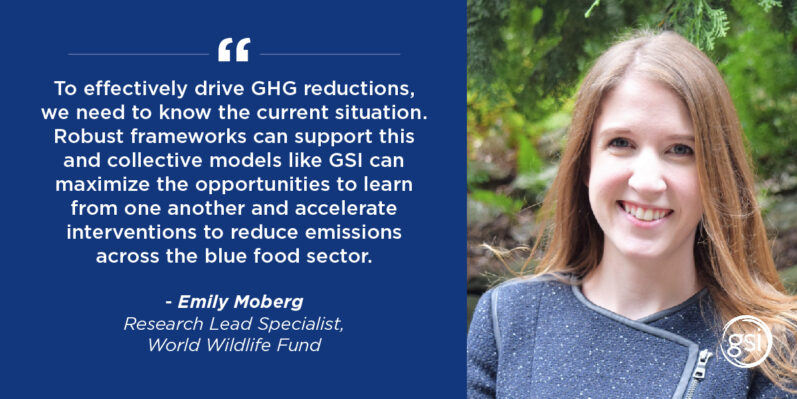
This is where groups like GSI can come in to accelerate change at the speed and scale referenced earlier. GSI is working with WWF and IDH to utilize a common accounting framework across the aquaculture sector, implementing consistent methodologies from feed to farm, and on to the consumer. This level of alignment in data not only means we can accurately compare options but also more accurately measure interventions to determine which will be most impactful at reducing GHG emissions.
Sophie highlighted the benefits of working pre-competitively on environmental issues; from motivating ambitious goals across the members, to the pooling of knowledge and resources and opportunities for shared learnings. These are all attributes the GSI model has proven successful in other areas such as sourcing of feed and working towards ASC certification.
IDH has also been utilizing the power of collaboration to drive industry-wide improvements across sectors. They are now working with aquaculture farmers to reduce their footprint, close the gap between producer and retailer and identify opportunities for further action. Lisa noted that there are too many scenarios where companies have made the same mistakes and we need to learn from this to help everyone make progress.
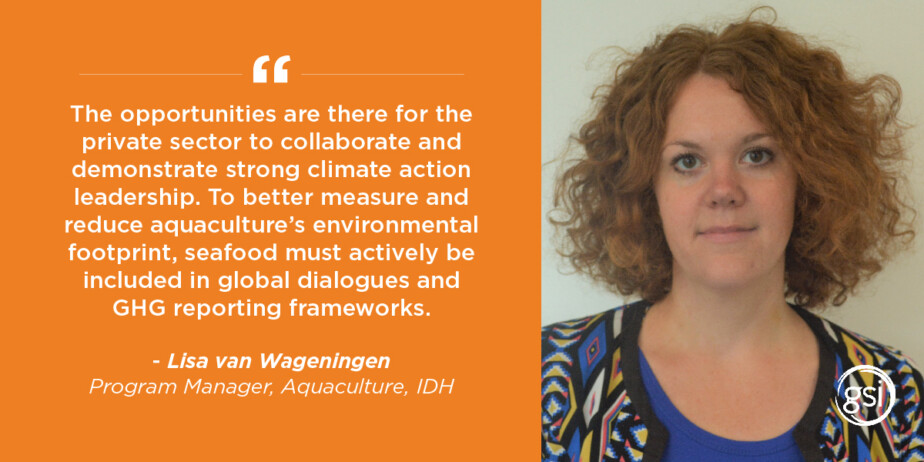
It’s not just the production side that has a role to play, retailers, buyers and consumers have choices to make as well. Collaboration across the supply chain also allows the knowledge to be shared to influence decisions down the line. Steve highlighted that retailers depend on reliable data to guide purchasing choices and help inform consumers so they can make educated decisions when shopping for food products.
Key takeaways from the panel
- Aligned, consistent data is critical
- Blue foods can play a crucial role in supporting healthy, climate-resilient food systems, and we must demonstrate this through data that is part of aligned dialogues within the wider food system
- Aligned data will also help us determine the right interventions to support mitigation efforts and support shared learnings to speed up progress
- Collaboration is key
- Collaboration across companies and across the supply chain will support action at speed and scale
- We have learnt from experience that changes in one part of the supply chain can often have knock-on effects somewhere else in the supply chain so we must work together in open dialogue to have the complete picture
- Through collaboration we can also learn from others – both good and bad experiences can be shared to save time and resources
- Sharing learnings drive improvements
- The farmed salmon sector can play a leading role in sharing its knowledge and technological advancements with other species to help the wider aquaculture industry further improve its carbon footprint
- It’s necessary to move from accountability to action
- Data is no longer simply used for transparency and to hold sectors accountable, the focus must be on using aligned, consistent data to drive action
Achieving climate goals is not an easy task, but the panel closed by sharing perspectives on what gives them hope for solutions in the aquaculture sector. With a focus on innovation and building off the sector’s history of rapid innovation to improve environmental performance, combined with the power of leaders who have demonstrated their willingness to work together on sustainability challenges, there was a shared belief that the sector has the tools and ability to drive change and move from purely lowering carbon emissions, to a position of strengthening climate resilience.
Continue to follow our work on climate reporting and mitigation across our channels – Twitter, Instagram and LinkedIn.
